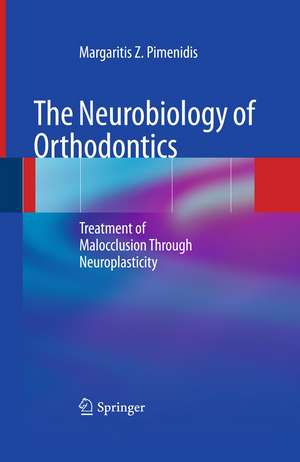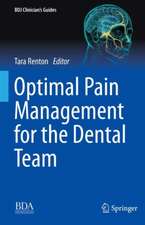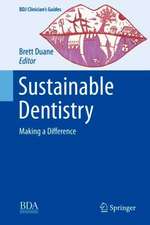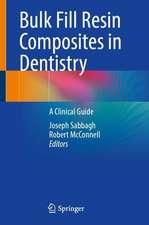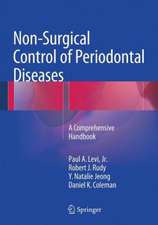The Neurobiology of Orthodontics: Treatment of Malocclusion Through Neuroplasticity
Autor Margaritis Z. Pimenidisen Limba Engleză Paperback – 13 dec 2014
| Toate formatele și edițiile | Preț | Express |
|---|---|---|
| Paperback (1) | 1276.57 lei 6-8 săpt. | |
| Springer Berlin, Heidelberg – 13 dec 2014 | 1276.57 lei 6-8 săpt. | |
| Hardback (1) | 1283.15 lei 6-8 săpt. | |
| Springer Berlin, Heidelberg – 21 aug 2009 | 1283.15 lei 6-8 săpt. |
Preț: 1276.57 lei
Preț vechi: 1343.76 lei
-5% Nou
Puncte Express: 1915
Preț estimativ în valută:
244.35€ • 265.51$ • 205.39£
244.35€ • 265.51$ • 205.39£
Carte tipărită la comandă
Livrare economică 21 aprilie-05 mai
Preluare comenzi: 021 569.72.76
Specificații
ISBN-13: 9783642434785
ISBN-10: 3642434789
Pagini: 168
Ilustrații: XVI, 150 p.
Dimensiuni: 155 x 235 x 9 mm
Greutate: 0.25 kg
Ediția:2009
Editura: Springer Berlin, Heidelberg
Colecția Springer
Locul publicării:Berlin, Heidelberg, Germany
ISBN-10: 3642434789
Pagini: 168
Ilustrații: XVI, 150 p.
Dimensiuni: 155 x 235 x 9 mm
Greutate: 0.25 kg
Ediția:2009
Editura: Springer Berlin, Heidelberg
Colecția Springer
Locul publicării:Berlin, Heidelberg, Germany
Public țintă
Professional/practitionerCuprins
Experience Changes the Brain.- Functional and Dysfunctional Aspects of Cerebral Cortex.- Sensory Deprivation of the Brain.- Sensory Deprivation and Thumbsucking Habit Activity.- Sensory Deprivation and Malocclusions of Teeth.- Sensory Deprivation and Occlusal Interferences.- Sensory Deprivation and Emotions in the Deciduous and Mixed Dentition.- Looking into Love and Depression-The Deep Limbic System.- Looking Into the 'Black Box'.- Language and Speech.- Mastication in Man.- Occlusion and Mastication.- The Chewing Cycle.- Directional Sensitivity of Teeth Guides Normal Occlusion.- Functional Malocclusion.- Functional Malocclusion Affects the Central Pattern Generator.- Factors Affecting the Maturation of the Central Pattern Generator.- Form and Function.- Applied Neurophysiological Concepts in Orthodontics.- Clinical Brain Function.- Orthodontic Avenues to Neuroplasticity.- Summary.
Textul de pe ultima copertă
This book presents the neurobiology of orthodontics according to the most recently acquired knowledge on the interaction of the brain activity with the senses. In particular, it highlights the ability of orofacial sensory input to modulate and change the brain activity underlying functions of the stomatognathic system, such as chewing, biting, speech, and occlusal feedback. The approach adopted thereby represents a significant departure from the theory and practice of traditional orthodontics, in which malocclusions of the teeth have been interpreted as deriving from DNA coding errors. The described new conceptualization of the etiology and diagnosis of malocclusions has profound implications for orthodontic therapy, as is clearly explained. Orthodontic therapy in turn has significant effects on the brain, which are documented in a chapter devoted to neuroimaging methods. By opening up new and creative pathways in the world of orthodontics, this book will hopefully both educate and excite the practitioner. It is recommended reading for all orthodontists.
Caracteristici
Presents a new conceptualization of the etiology and diagnosis of malocclusions in which emphasis is placed on the interaction of orofacial sensory input with the brain Explains the implications of this new conceptualization for orthodontic therapy Documents the effects of orthodontic therapy on the brain Opens new, exciting research pathways in the world of orthodontics Includes supplementary material: sn.pub/extras
